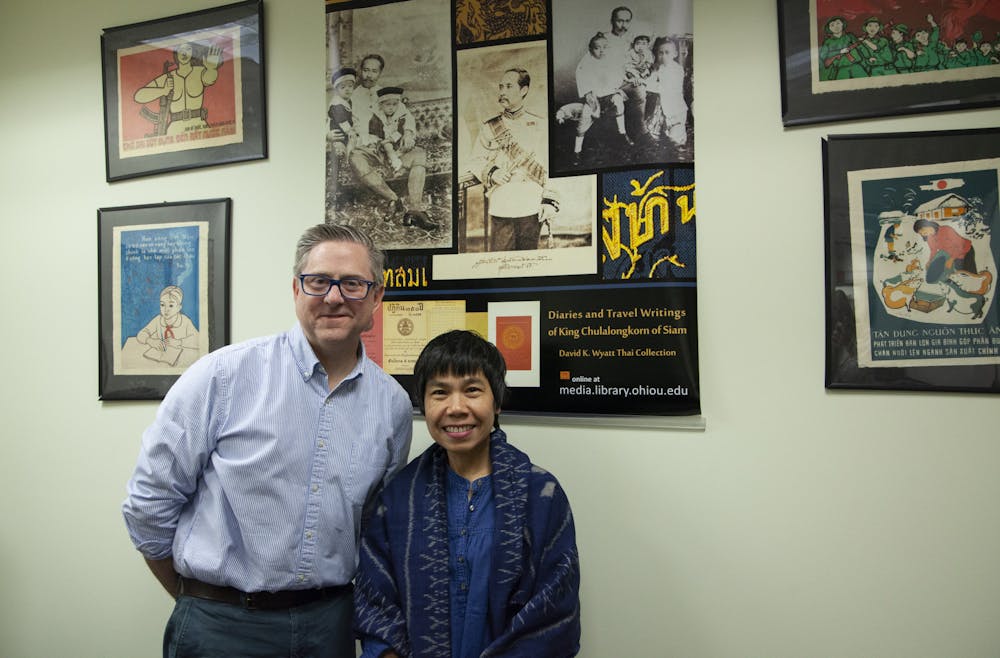In 2024, Bobcats are celebrating the 25th anniversary of the Ohio University Thai language program, marking a quarter-century of vibrant cultural exchange and enriched language instruction.
Thai is the official language of Thailand, a kingdom with a population of approximately 60 million people. Despite this, only eight Southeast Asian Studies programs have been officially designated as national resources and receive funding from the Department of Education in the United States.
OU’s Center for Southeast Asian Studies proudly stands as one of these distinguished programs, according to OU’s website.
The maintenance and success of the Thai program can be attributed to hardworking students and faculty like Jeffery Shane and Pittaya Paladroi-Shane.
Shane, the Southeast Asia reference librarian at OU, served as a Peace Corps volunteer in Thailand for five years before coming to OU as a graduate student.
“At the time, we only offered Indonesian language and obviously there's more than just Indonesian language,” Shane said. “There are multiple languages in Southeast Asia.”
In order to reflect the language diversity fostered in Southeast Asia, Shane worked with the linguistics faculty to jump-start the Thai language program at OU.
Paladroi-Shane is an associate professor of instruction of Thai and world languages and the world languages coordinator at the Center for International Studies. Paladroi-Shane first became an instructor of Thai language at OU as a teaching assistant in 2006.
Paladroi-Shane and Shane first met in 2004. The pair eventually got married and continued to revamp and strengthen the program together.
Paladroi-Shane said the program has evolved exponentially since its implementation. She has revamped the curriculum to focus on the Thai language as a skill, as well as different layers of Thai culture.
“Thai language and also Indonesian, Hindi, Malaysian: these languages, including African languages, are considered to fulfill “BRICKS” requirements because students have to discuss different topics related to national ideology,” Paladroi-Shane said. “We talk about family dynamics, we talk about gender roles, we talk about what you call ‘do's and don'ts.’”
The Thai language program is fairly small, consisting of about 10 students currently. The size of the program allows one-on-one instruction and interpersonal connections between Paladroi-Shane and students.
“Since the birth of what we call ‘less commonly taught languages’ at Cornell University, the number they actually focus on is a small group of students, because they wanted to work on really developing high proficiency,” Paladroi-Shane said.
The Thai program at OU also offers numerous experiential learning opportunities.
One of these experiences is an annual study abroad trip during winter break. According to Paladroi-Shane, the next abroad experience will take place from Dec. 30, 2024, through Jan. 9, 2025.
Shane said Thai is a difficult language to learn and the trip provides students opportunities to foster their understanding of the Thai language.
"Our study abroad programs can also help them not just to understand the Thai language, to learn Thai language, but the trips we take to Thailand, that gives them an incentive to learn Thai,” Shane said.
Another experiential learning opportunity for Thai language students is the annual Thai Night, an event that fosters cultural exchange.
This year’s Thai Night took place Sunday, April 14 and was organized during Songkran or Thai New Year. Thai Night features different cultural performances, such as a dance and a fashion show. Students had an opportunity to speak on stage about their experience visiting Thailand.
Russell Morrow, the interim vice president for diversity and inclusion, and Gillian Ice, the interim associate provost for global affairs spoke at Thai Night to explain the importance of the Thai program at OU.
“It's not just about teaching the language, but this is an opportunity for them to work with Thai students to understand how to work and to develop intercultural competence as well as cross-cultural communication because they have to collaborate closely to pull together to do this big event,” Paladroi-Shane said.
As Paladroi-Shane and Shane continue to work diligently to improve and support the Thai language program at OU, they remain hopeful the program will continue to see success.
“We want to continue doing what we're doing but also building onto success,” Shane said. “It would be really nice if we could increase the number of students just a little bit and if that happens, then it'll just continue to expand.”
Paladroi-Shane said Thailand has a rich, important culture. She hopes the future of the Thai language program brings about more students interested in fostering a sense of cultural competency and understanding.
“We hope in the next phase of the Thai language program, we can contribute more, not just only for robust academic preparation, but we hope to also inspire students to become much more inclusive, become much more culturally prepared,” she said.






